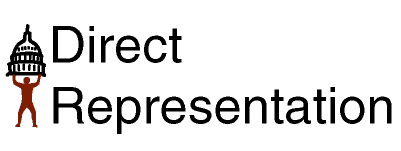
|
|
 About DR
About DR
|
What is Direct Representation?
It is a way to fulfill the fundamental principle of a republic: that every voter deserves a voice in government. That voice should be one that the voter prefers most from among a wide range of options. This can only be achieved if voters choose their representatives individually, and if their choice is minimally affected by the choices of others. Direct Representation is designed to meet these criteria.
How does Direct Representation work?
In a Direct Republic:
- Within a month after your birthday, you could secretly choose any
existing legislator to be your representative. At any time of the year, you could
also make pledges to switch to a candidate who is trying to get enough votes
to enter the legislature. You would be committed to the first such candidate who receives
enough pledges to enter.
- Legislators would have voting power in proportion to the number of votes for them.
There would be a maximum and minimum number of votes allowed, keeping the legislature?s
size between (for example) 100 and 1000. For a city council, these limits could be
as low as 5 and 20.
- Voter's perspective:
-
In a Direct Republic, you could choose the best among hundreds
of candidates, guaranteeing that you will have a powerful voice for your
interests. Your vote would always have a real, incremental effect on the
legislature. You could re-evaluate your choice and choose another every
year at your convenience. A one-year delay would ensure that power flows
smoothly and that people think carefully about their decision.
- Candidate's perspective:
-
Candidates would enter the legislature through targeted campaigns that
resemble petition drives, not through vicious, expensive battles against an opponent.
Once they have gained enough pledges, they have a guaranteed job for at least a year, and
gradually accumulate power.
- Legislator's perspective:
-
Legislators' power would fluctuate slowly according to
their effectiveness and popularity, giving them a degree of real-time
feedback on their performance. Rather than ride the roller coaster of election cycles,
they would maintain a continuous, low-key, targeted campaign. Their constituents would
share common interests, and not be defined by arbitrary boundaries on a map, so they
would be easy to represent.
- The legislature:
-
The legislature as a whole would slowly evolve to match the
national interest, rather than change drastically as parties alternately
seize control. It would consist of coalitions of several parties that
would cooperate on various issues.

